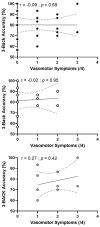A Cross-Sectional Comparison of Arterial Stiffness and Cognitive Performances in Physically Active Late Pre- and Early Post-Menopausal Females
- PMID: 35884708
- PMCID: PMC9312988
- DOI: 10.3390/brainsci12070901
A Cross-Sectional Comparison of Arterial Stiffness and Cognitive Performances in Physically Active Late Pre- and Early Post-Menopausal Females
Abstract
Menopause accelerates increases in arterial stiffness and decreases cognitive performances. The objective of this study was to compare cognitive performances in physically active pre- and post-menopausal females and their relationship with arterial stiffness. We performed a cross-sectional comparison of blood pressure, carotid−femoral pulse wave velocity (cf-PWV) and cognitive performances between physically active late pre- and early post-menopausal females. Systolic (post-menopause—pre-menopause: +6 mmHg [95% CI −1; +13], p = 0.27; ŋ2 = 0.04) and diastolic (+6 mmHg [95% CI +2; +11], p = 0.06; ŋ2 = 0.12) blood pressures, and cf-PWV (+0.29 m/s [95% CI −1.03; 1.62], p = 0.48; ŋ2 = 0.02) did not differ between groups. Post-menopausal females performed as well as pre-menopausal females on tests evaluating executive functions, episodic memory and processing speed. Group differences were observed on the computerized working memory task. Post-menopausal females had lower accuracy (p = 0.02; ŋ2 = 0.25) but similar reaction time (p = 0.70; ŋ2 < 0.01). Moreover, this performance was inversely associated with the severity of menopausal symptoms (r = −0.38; p = 0.05). These results suggest that arterial stiffness and performance on tests assessing episodic memory and processing speed and executive functions assessing inhibition and switching abilities did not differ between physically active pre- and post-menopausal females. However, post-menopausal females had lower performance on a challenging condition of a working memory task, and this difference in working memory between groups cannot be explained by increased arterial stiffness.
Keywords: executive functions; vascular health; working memory.
Conflict of interest statement
The authors declare no conflict of interest. The funders had no role in the design of the study; in the collection, analyses, or interpretation of data; in the writing of the manuscript, or in the decision to publish the results.
Figures





References
-
- Rensma S.P., Stehouwer C.D.A., Van Boxtel M.P.J., Houben A.J.H.M., Berendschot T.T.J.M., Jansen J.F.A., Schalkwijk C.G., Verhey F.R.J., Kroon A.A., Henry R.M.A., et al. Associations of Arterial Stiffness with Cognitive Performance, and the Role of Microvascular Dysfunction: The Maastricht Study. Hypertension. 2020;75:1607–1614. doi: 10.1161/HYPERTENSIONAHA.119.14307. - DOI - PubMed
-
- Thorin-Trescases N., de Montgolfier O., Pinçon A., Raignault A., Caland L., Labbé P., Thorin E. Impact of Pulse Pressure on Cerebrovascular Events Leading to Age-Related Cognitive Decline. Am. J. Physiol.-Heart Circ. Physiol. 2018;314:H1214–H1224. doi: 10.1152/ajpheart.00637.2017. - DOI - PMC - PubMed
-
- Tomoto T., Liu J., Tseng B.Y., Pasha E.P., Cardim D., Tarumi T., Hynan L.S., Munro Cullum C., Zhang R. One-Year Aerobic Exercise Reduced Carotid Arterial Stiffness and Increased Cerebral Blood Flow in Amnestic Mild Cognitive Impairment. J. Alzheimers Dis. JAD. 2021;80:841–853. doi: 10.3233/JAD-201456. - DOI - PubMed
-
- Alvarez-Bueno C., Cunha P.G., Martinez-Vizcaino V., Pozuelo-Carrascosa D.P., Visier-Alfonso M.E., Jimenez-Lopez E., Cavero-Redondo I. Arterial Stiffness and Cognition Among Adults: A Systematic Review and Meta-Analysis of Observational and Longitudinal Studies. J. Am. Heart Assoc. 2020;9:e014621. doi: 10.1161/JAHA.119.014621. - DOI - PMC - PubMed
Grants and funding
LinkOut - more resources
Full Text Sources

